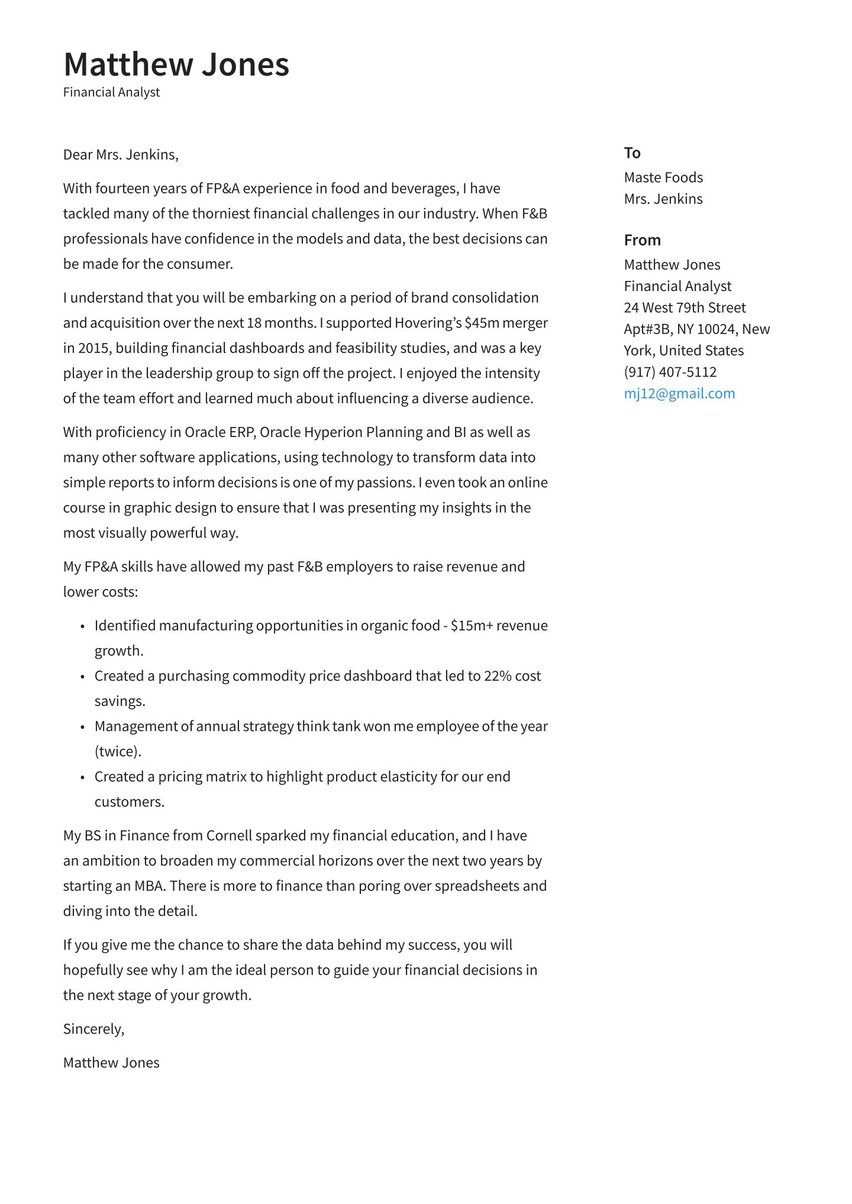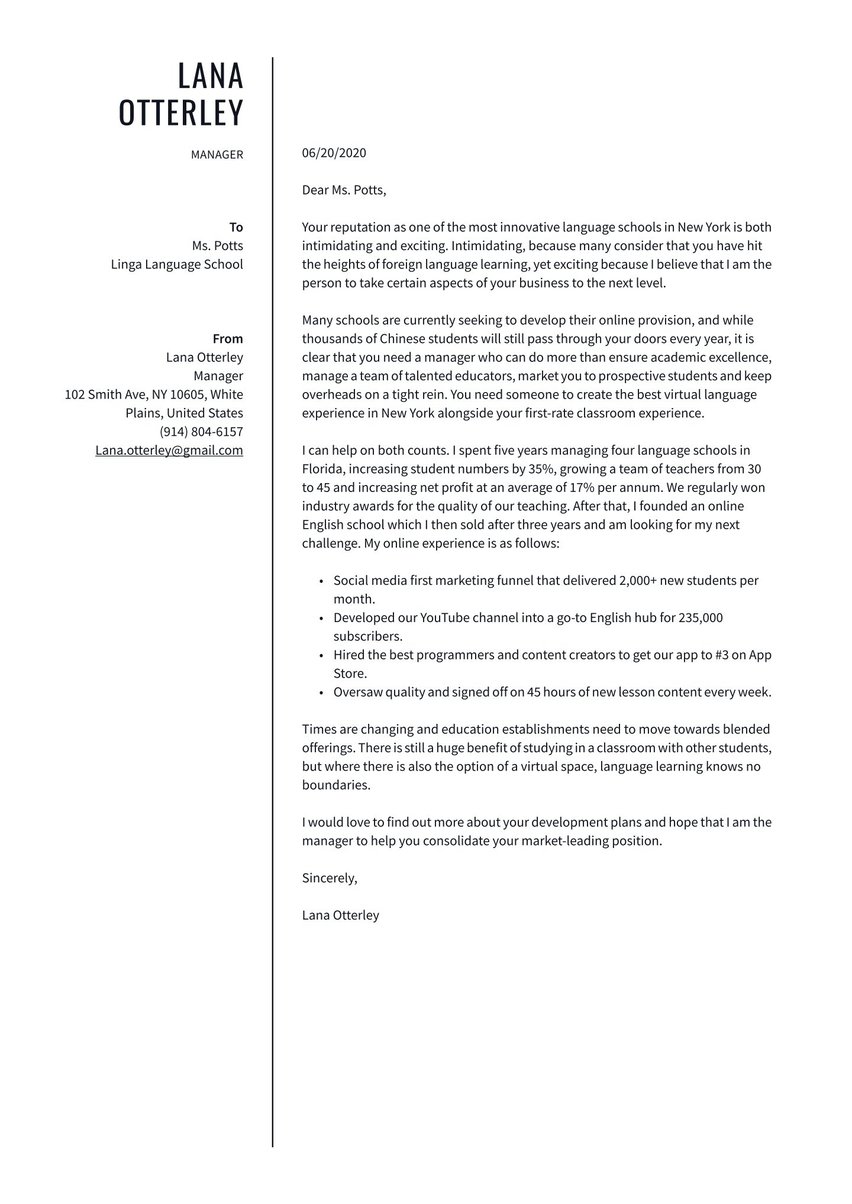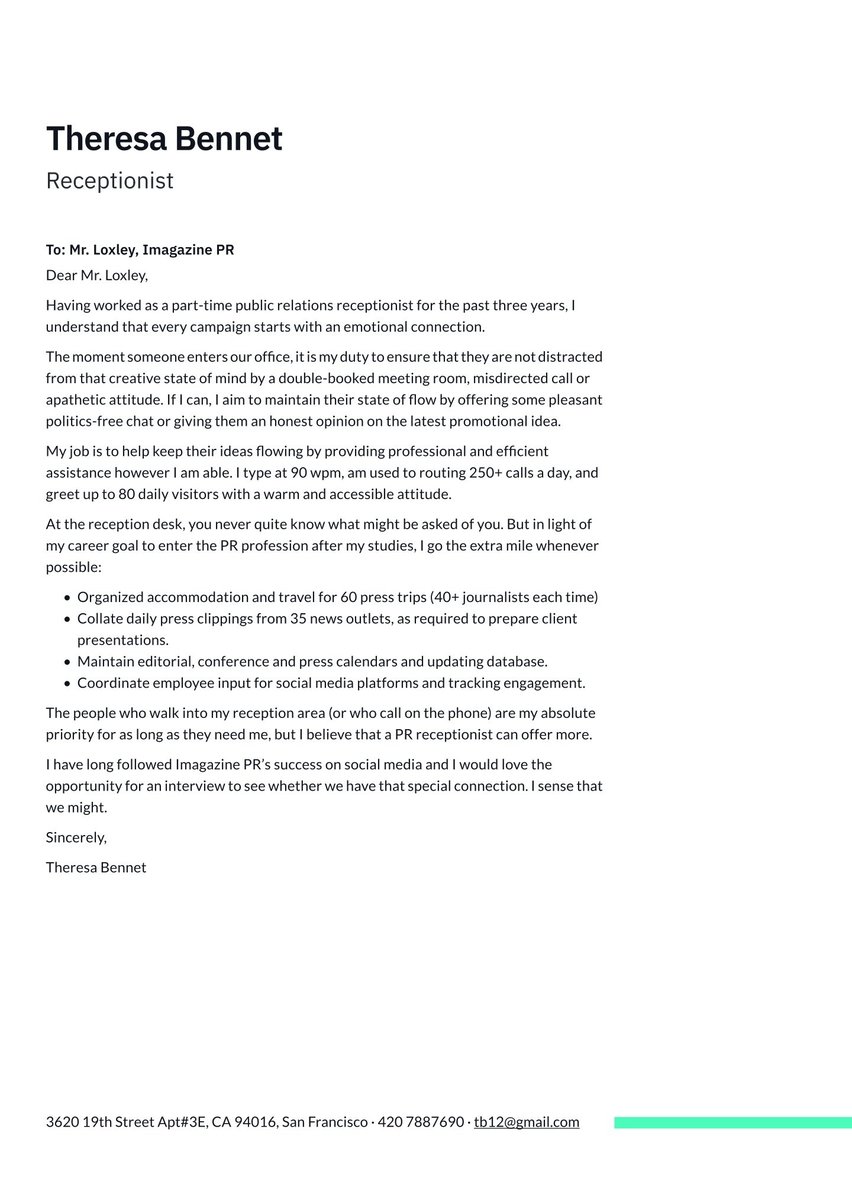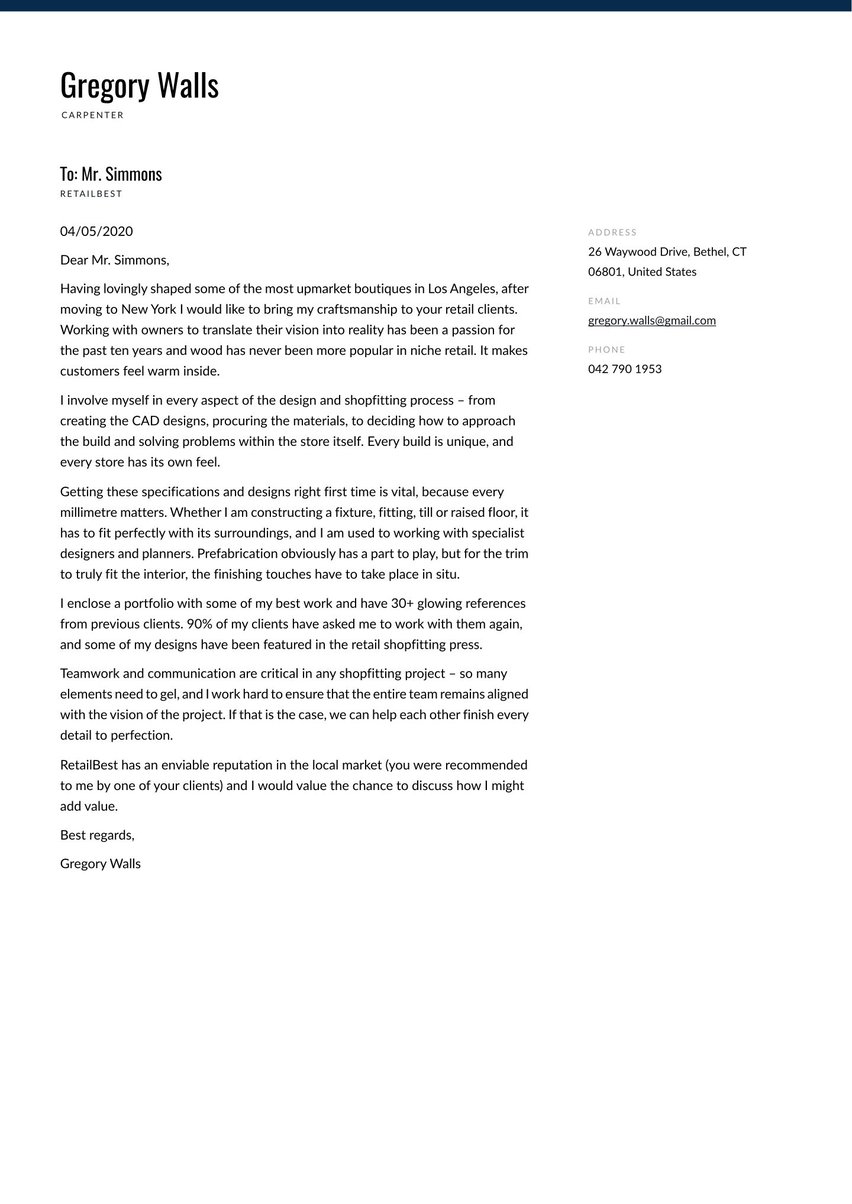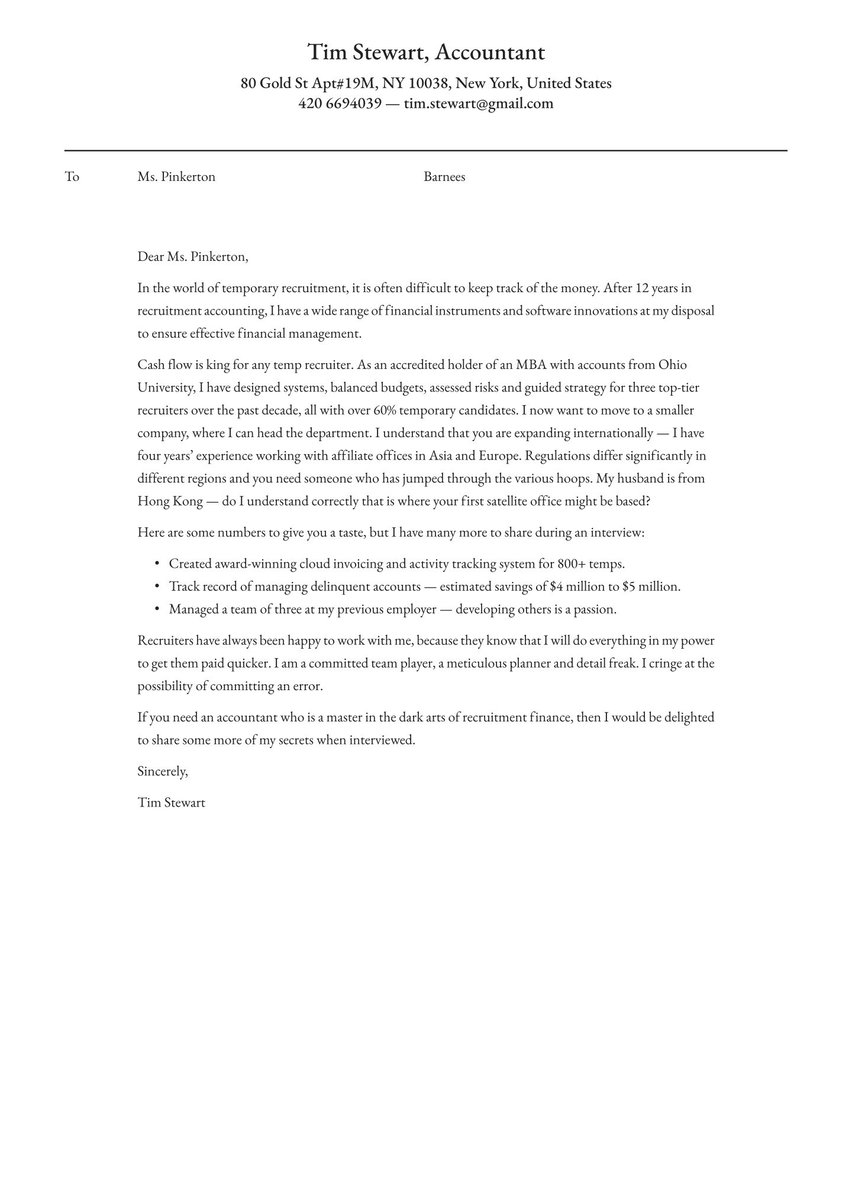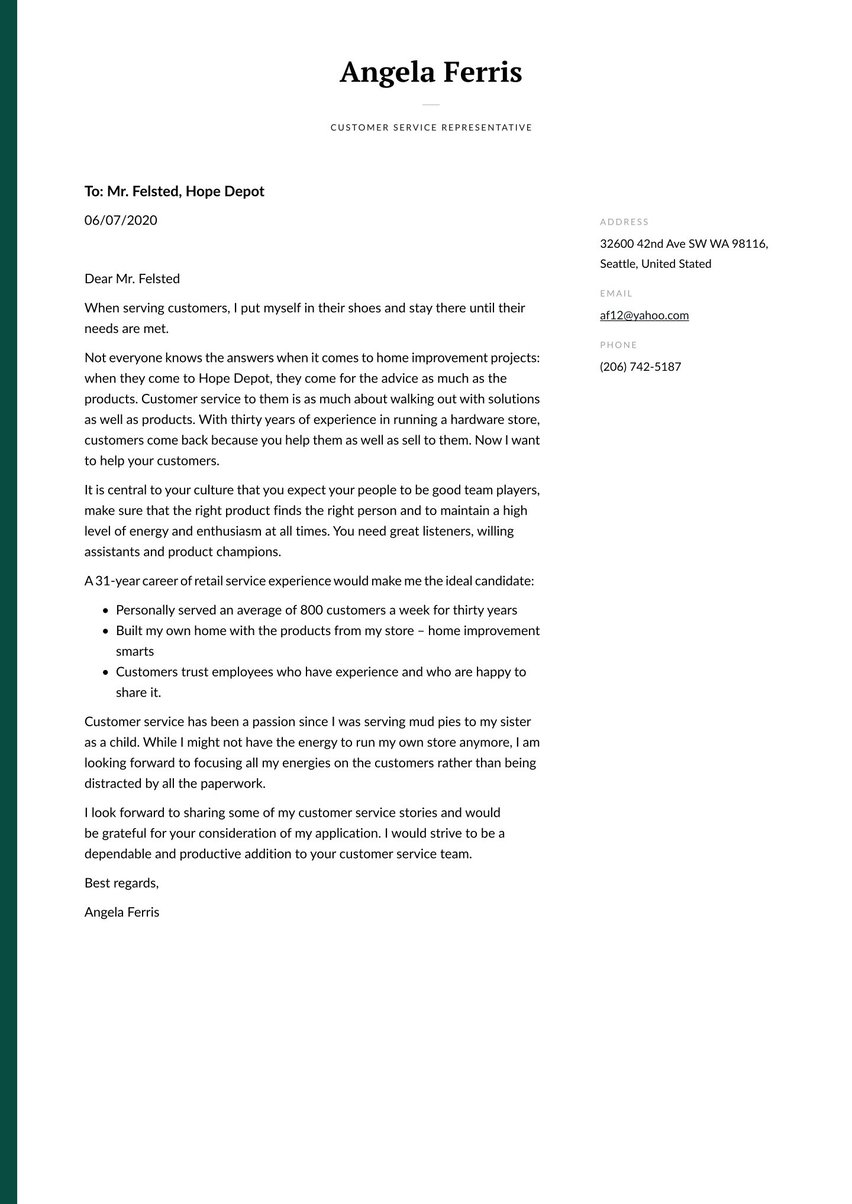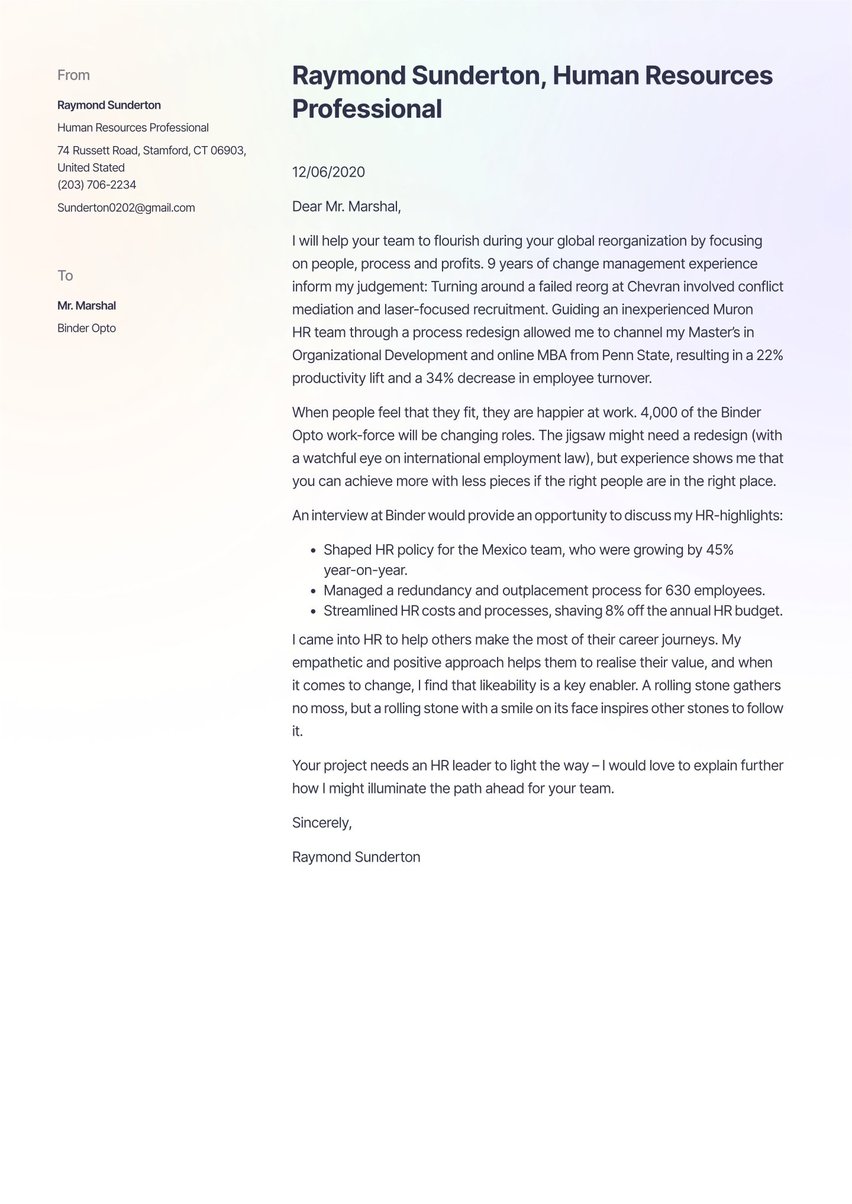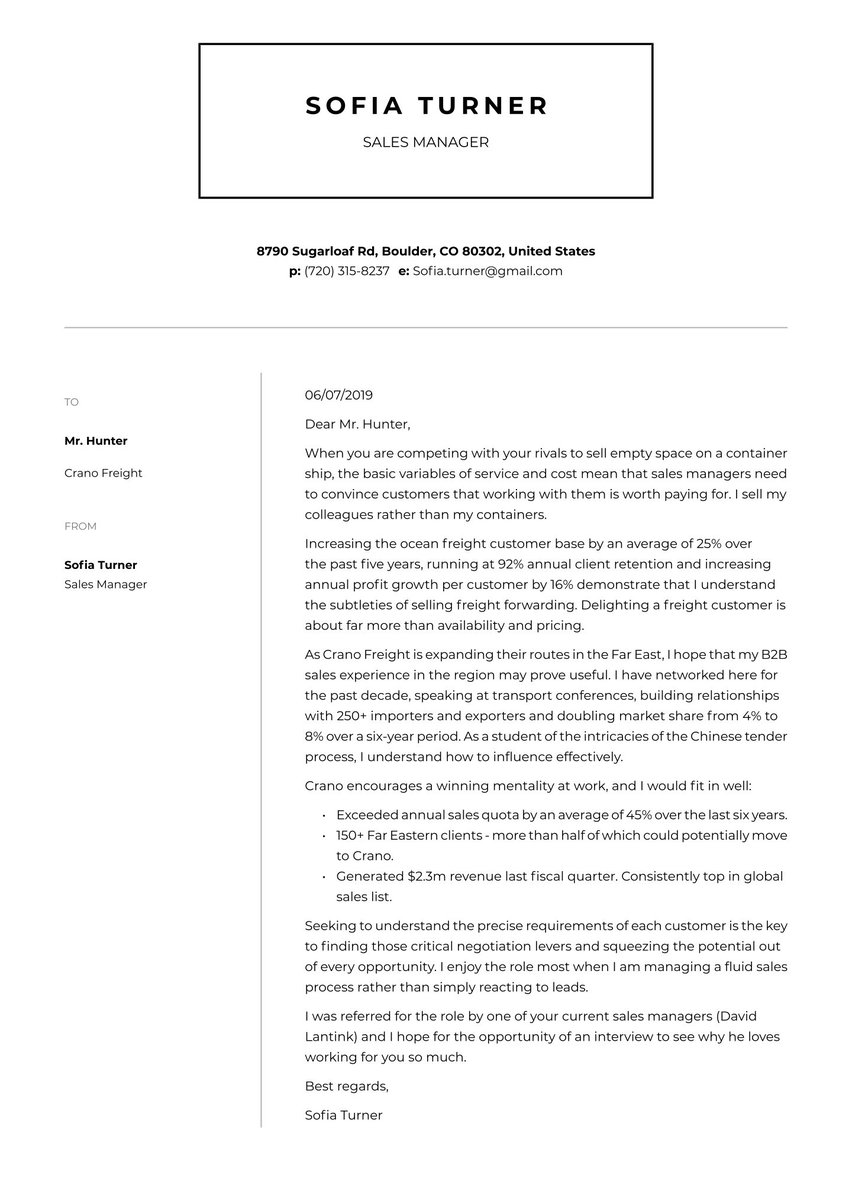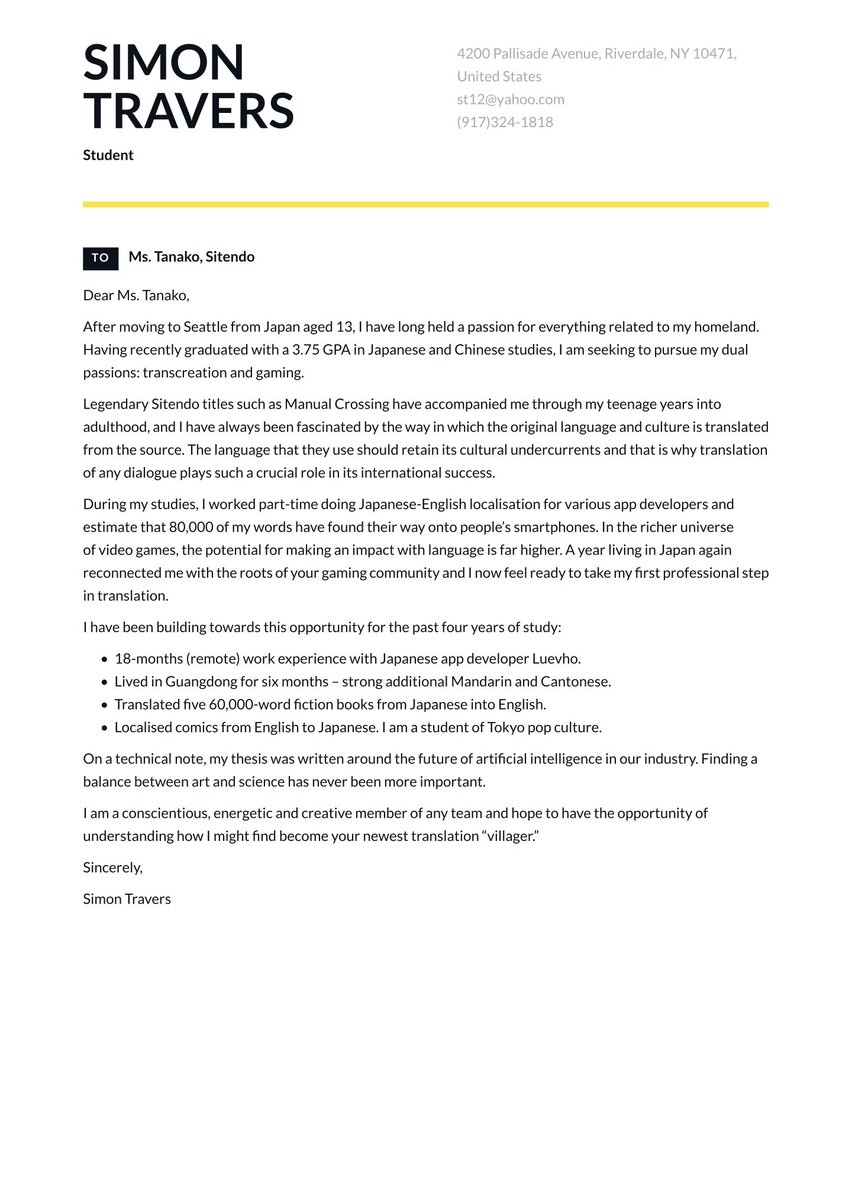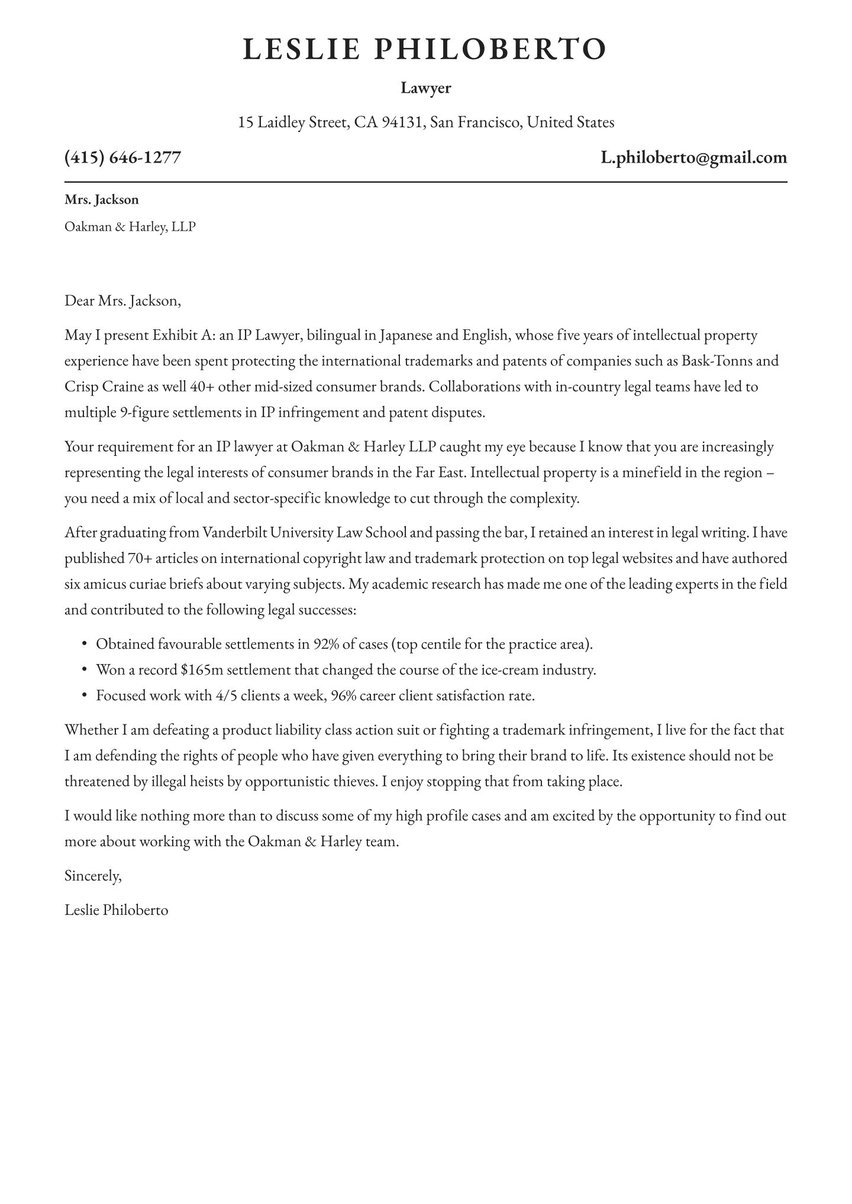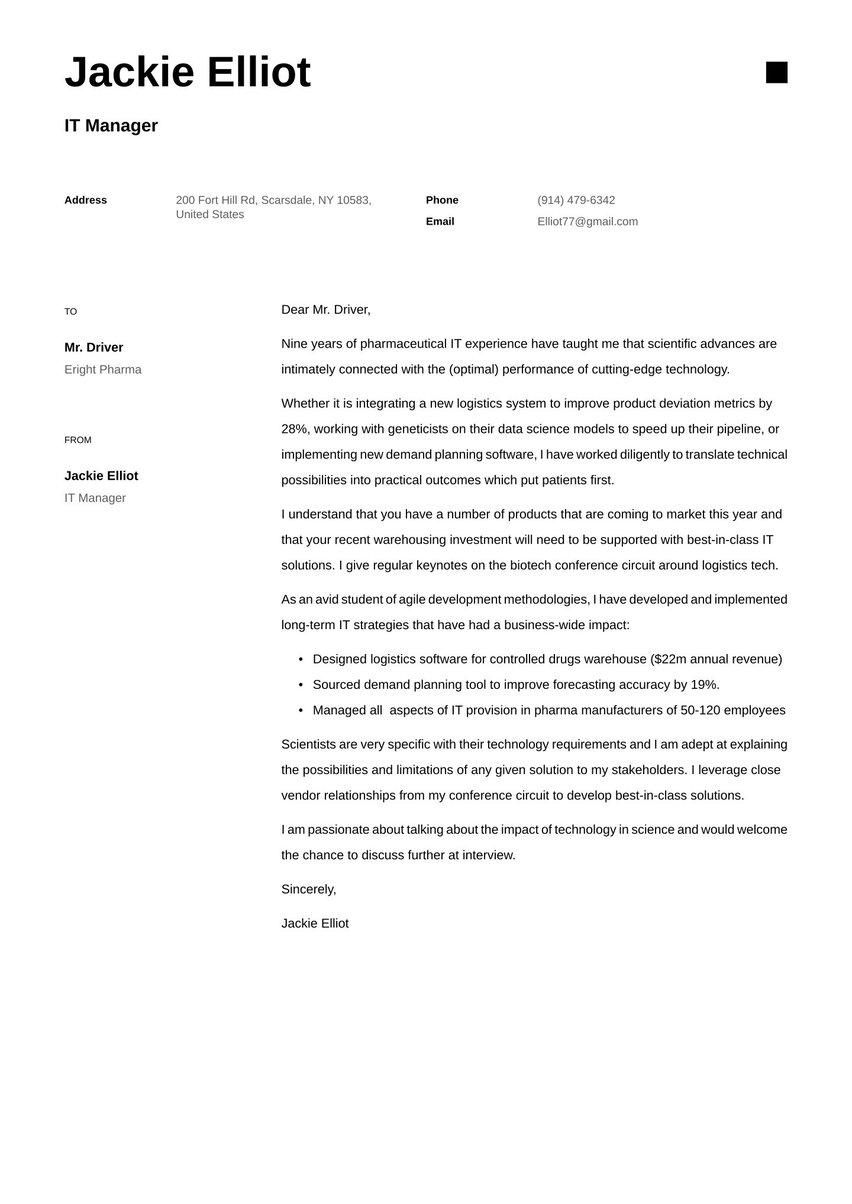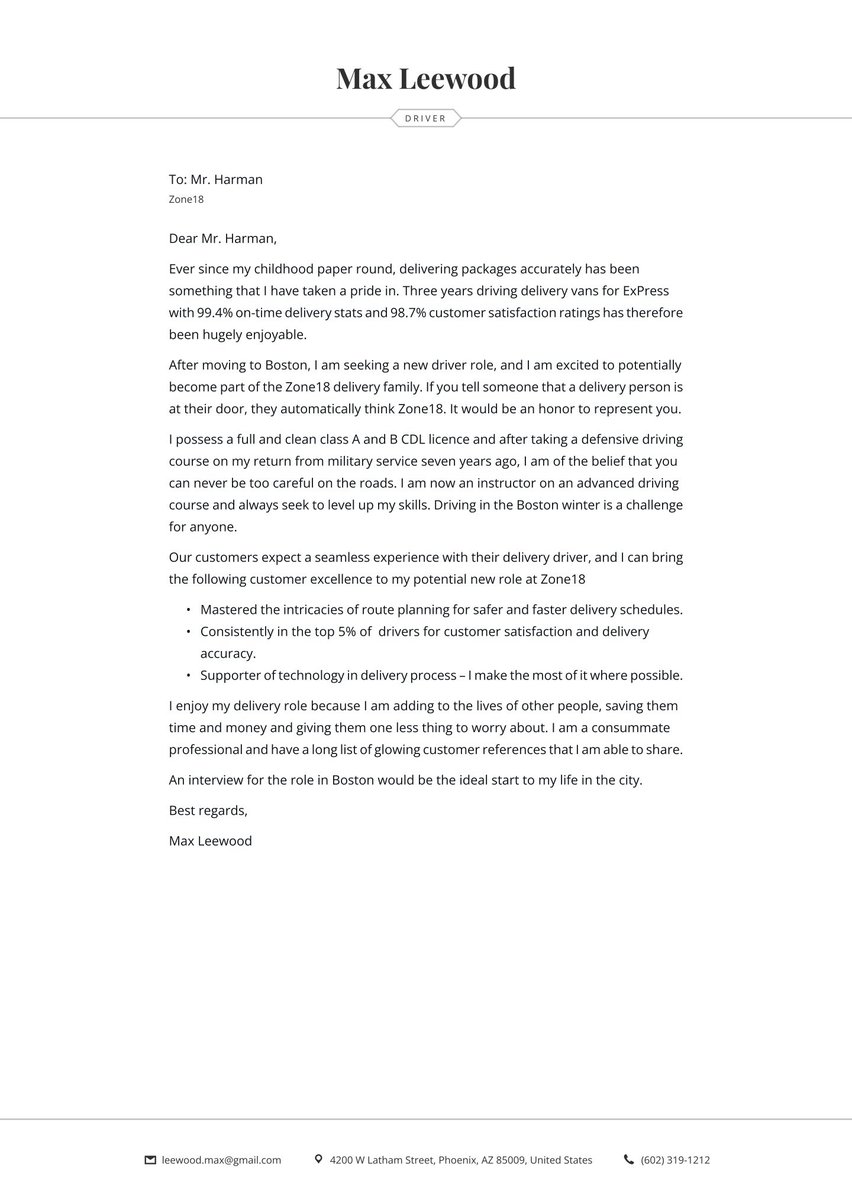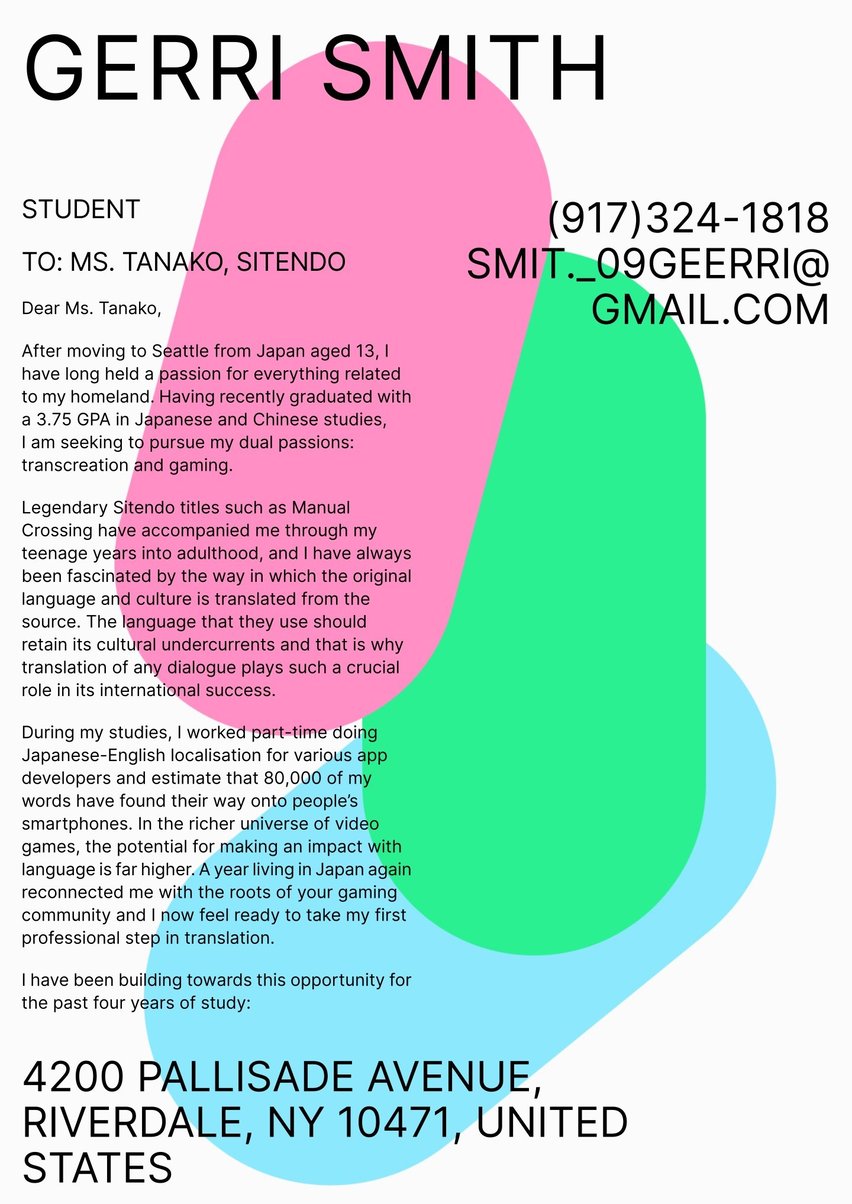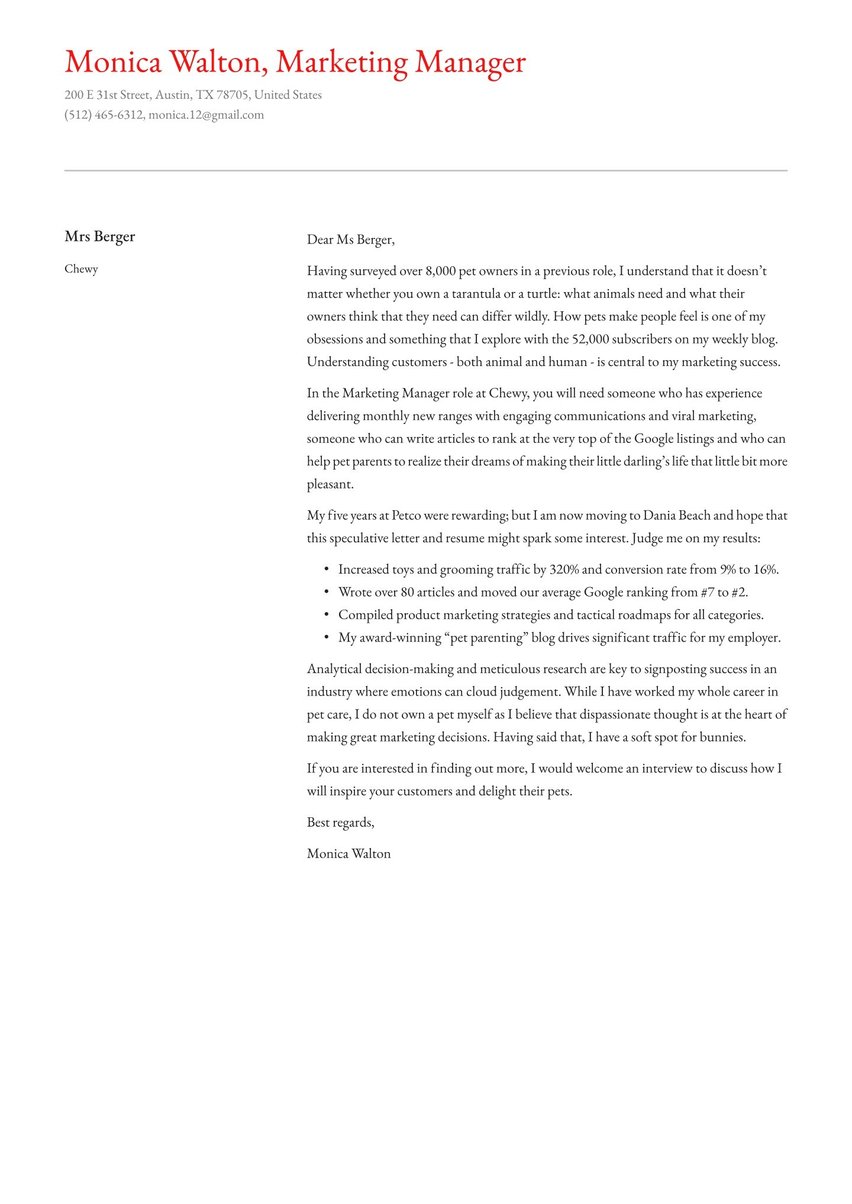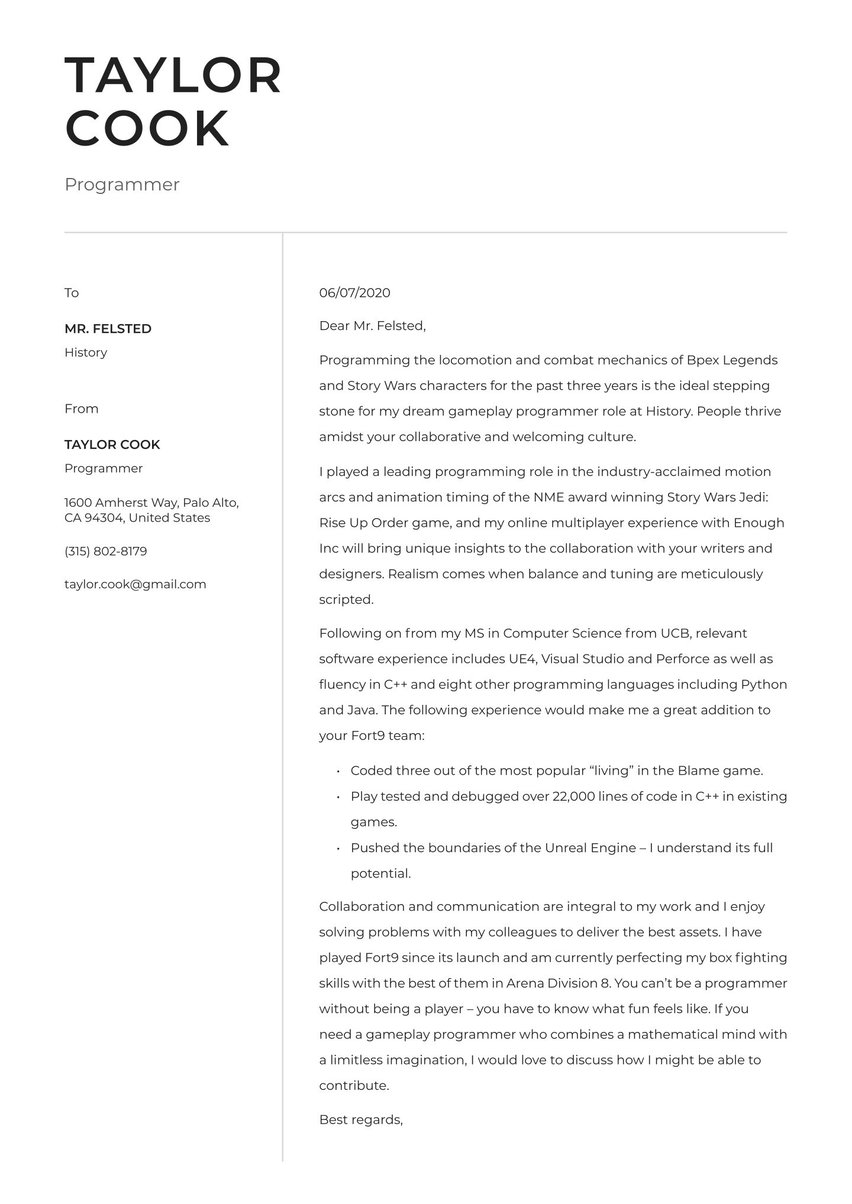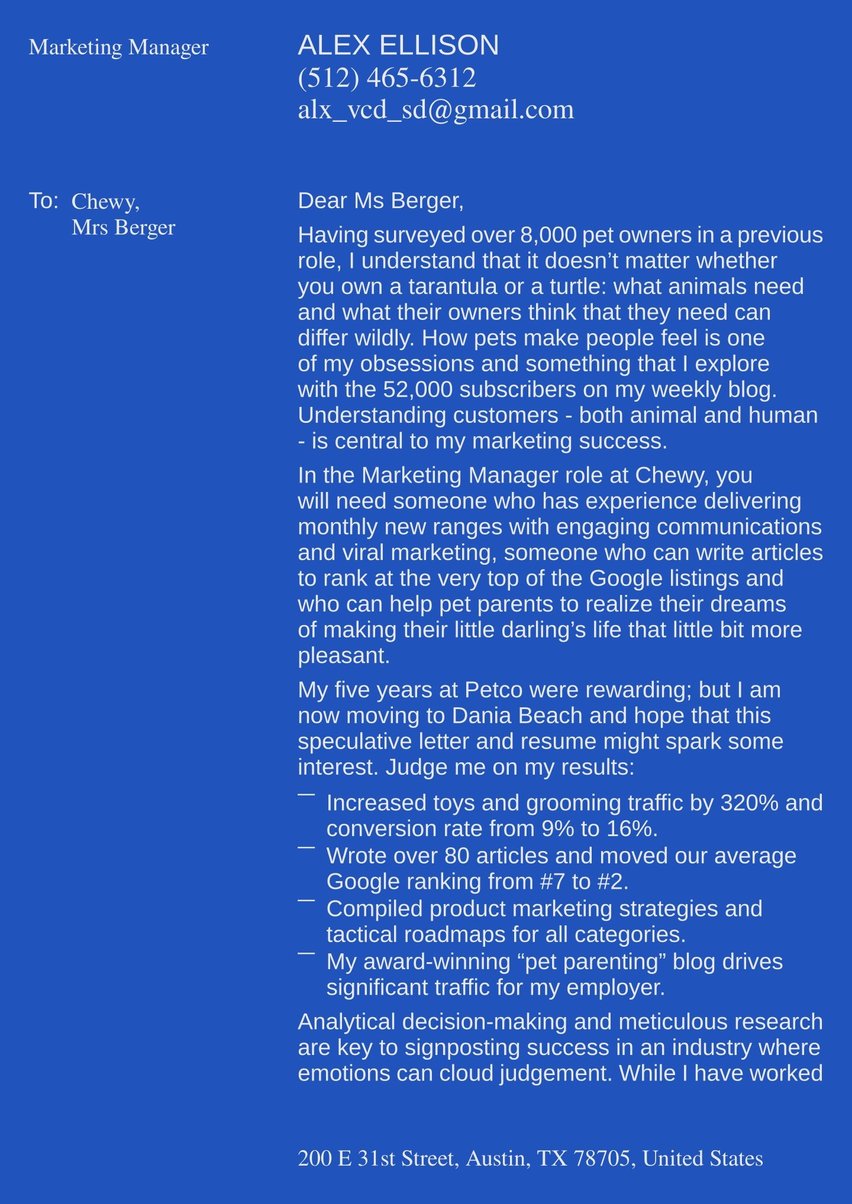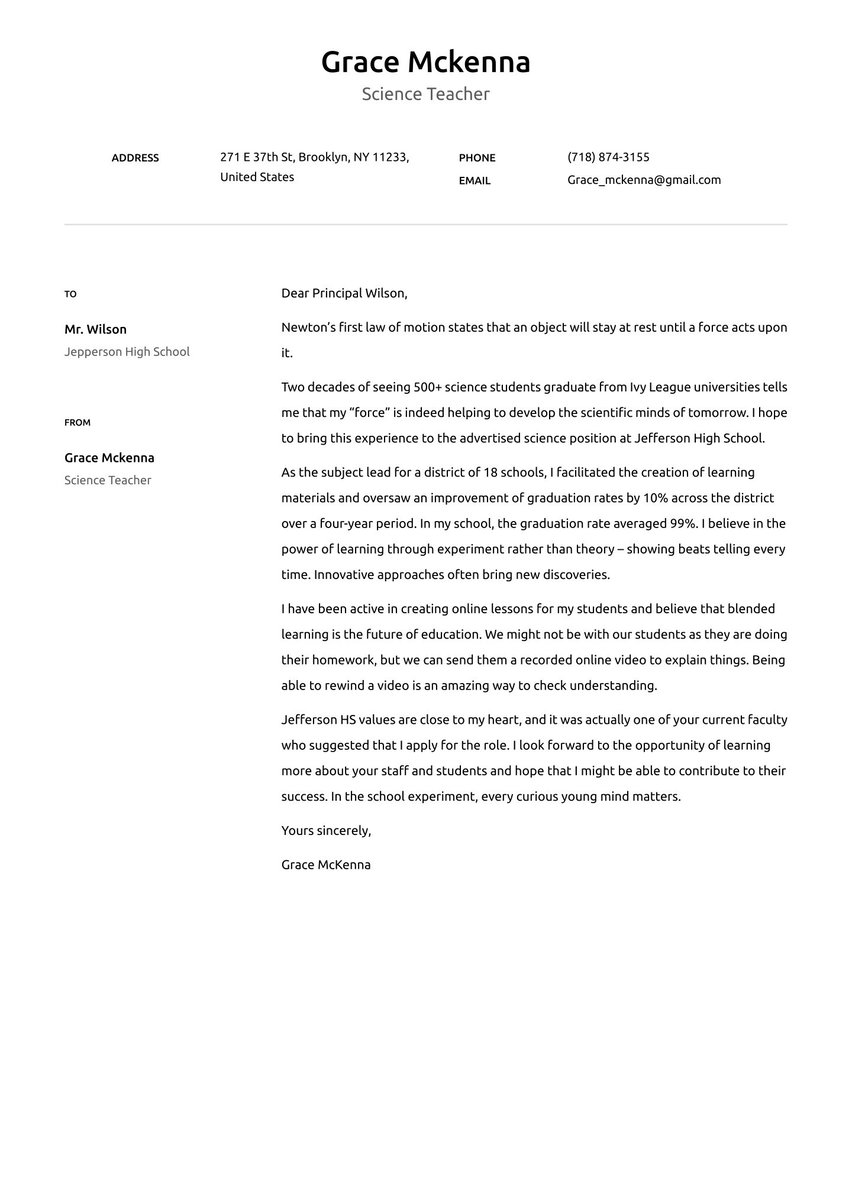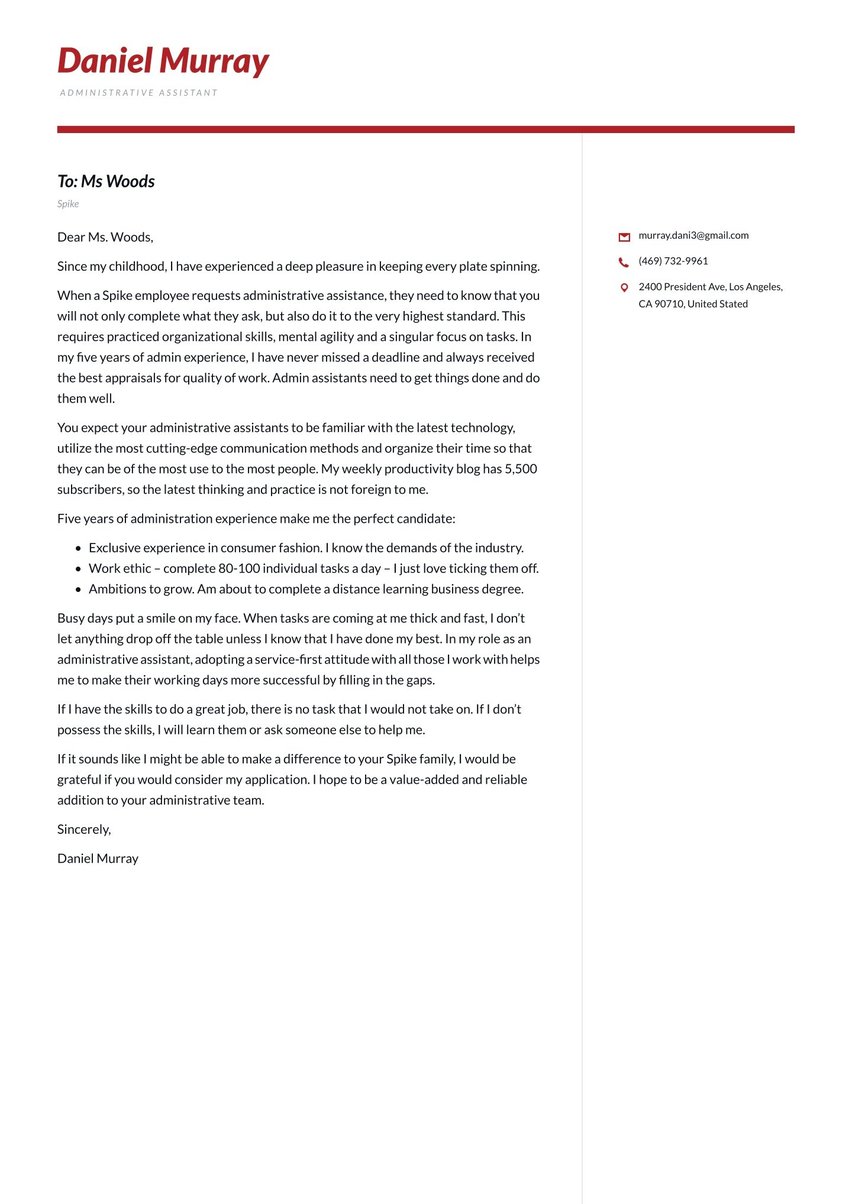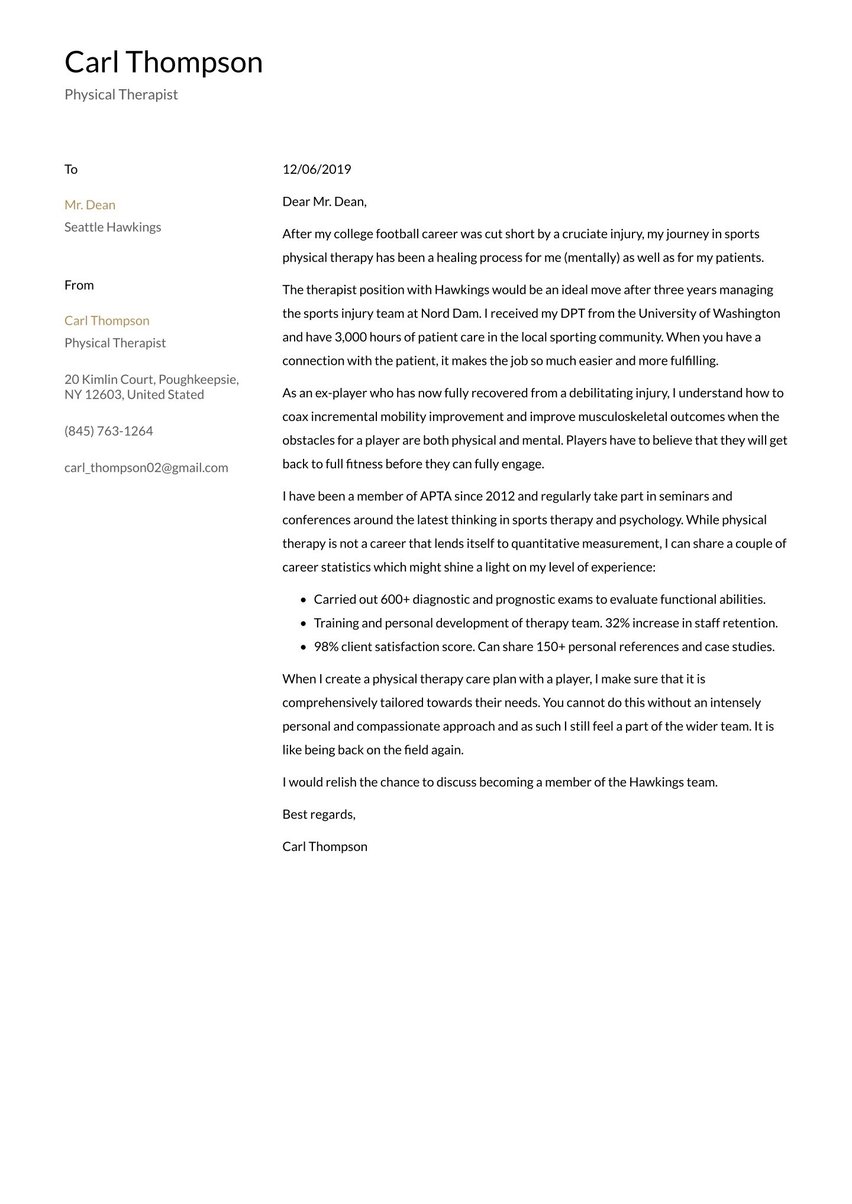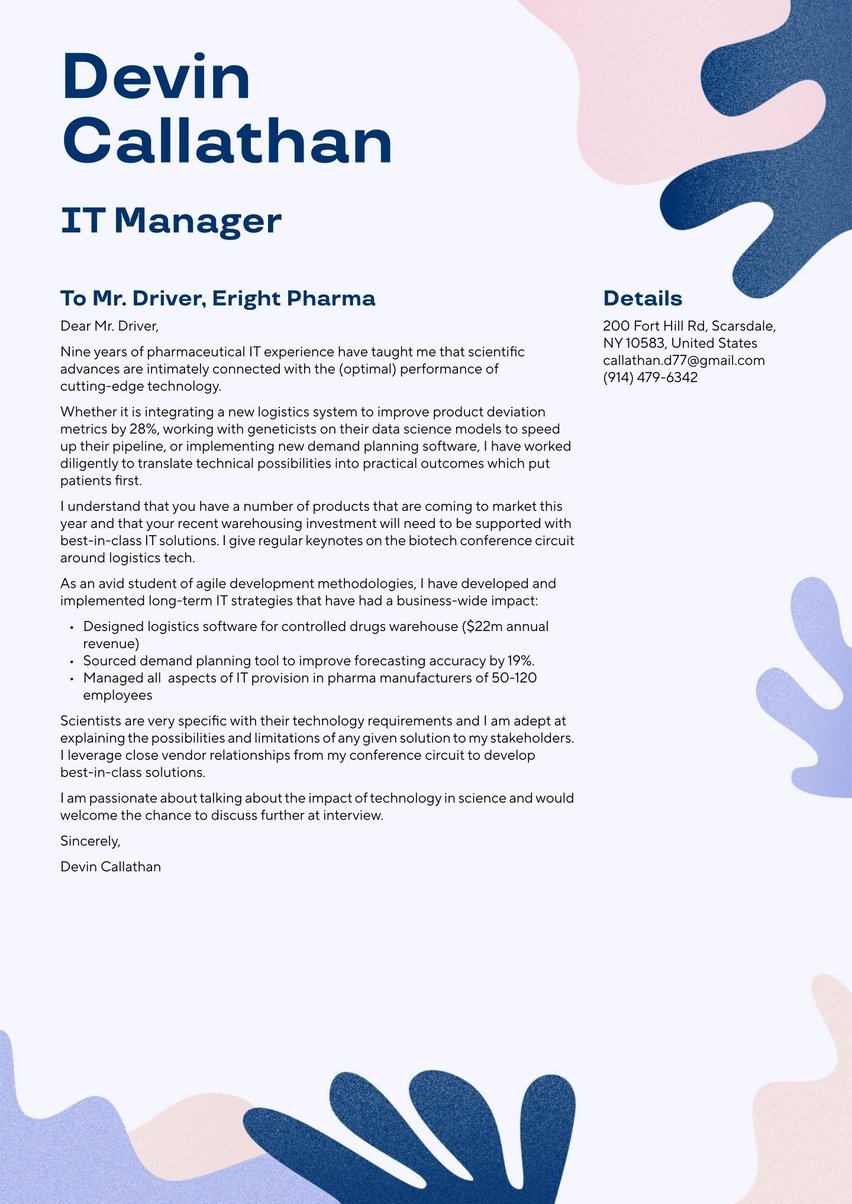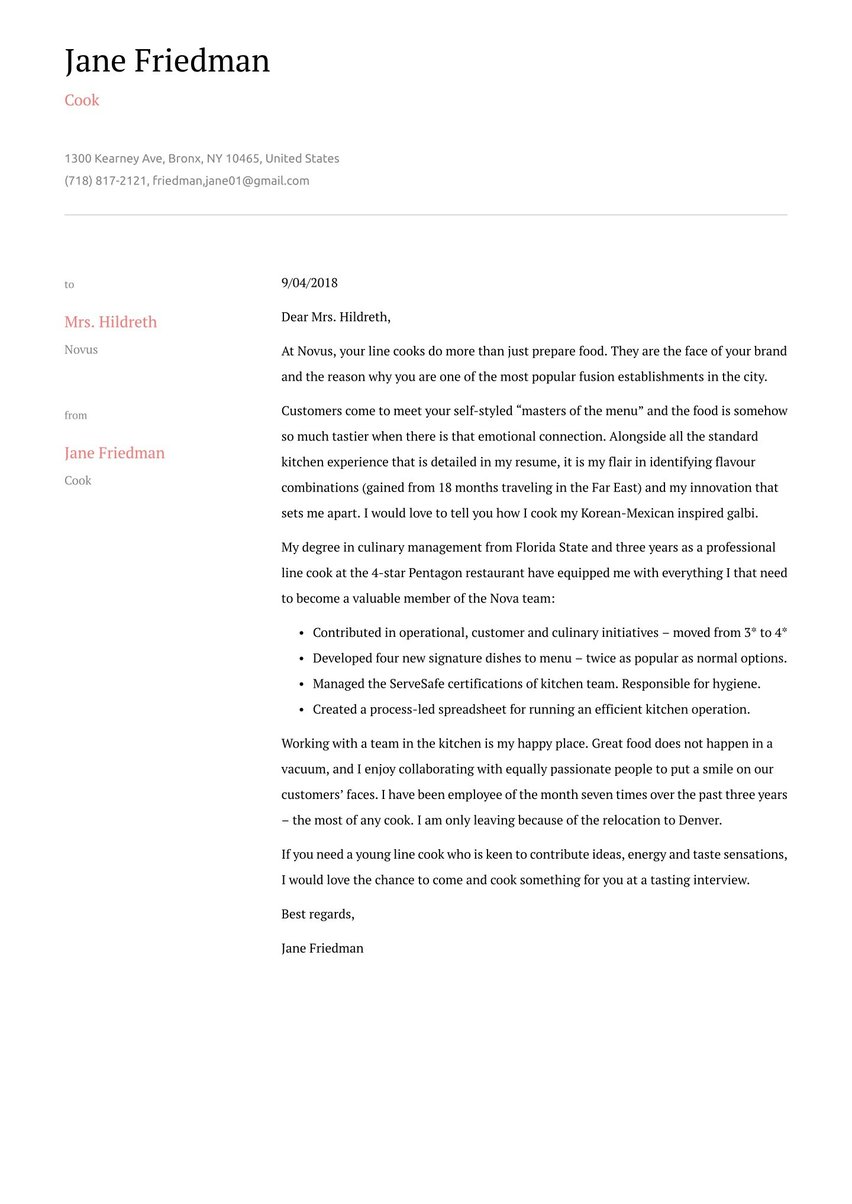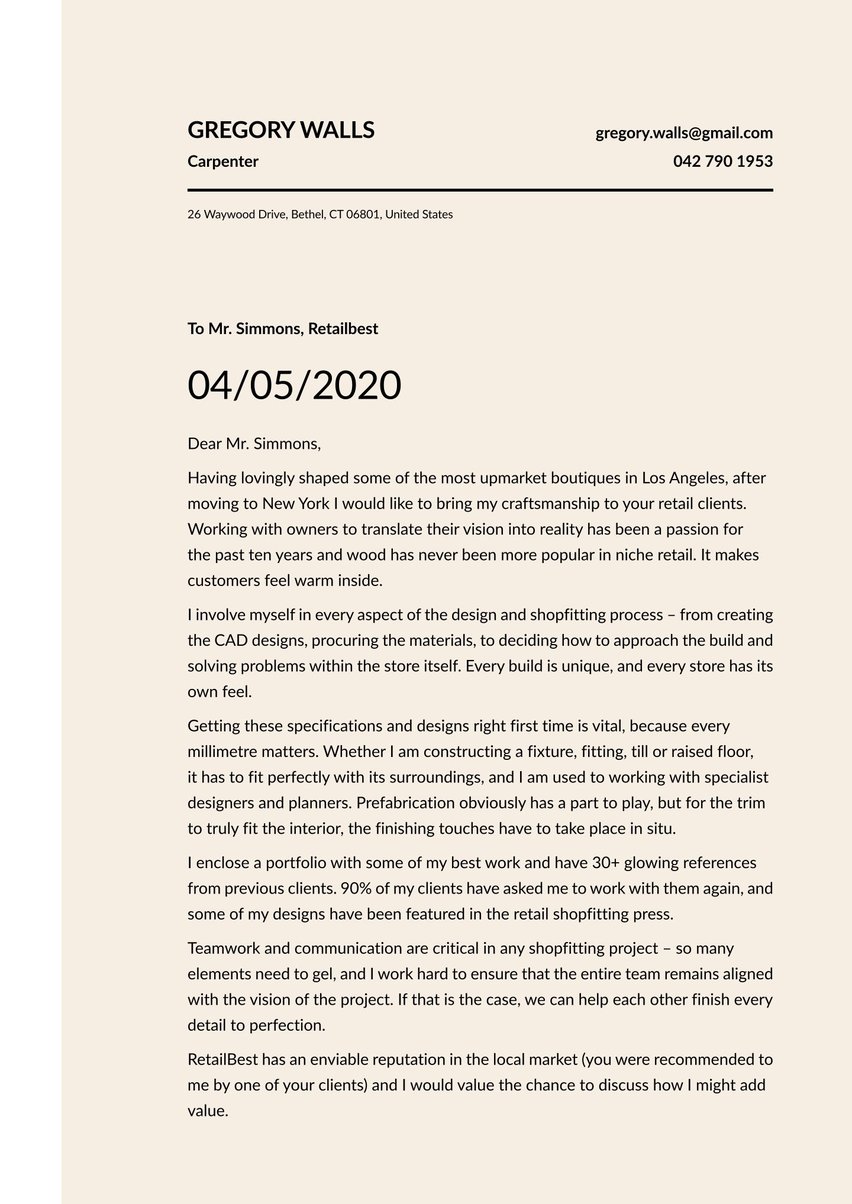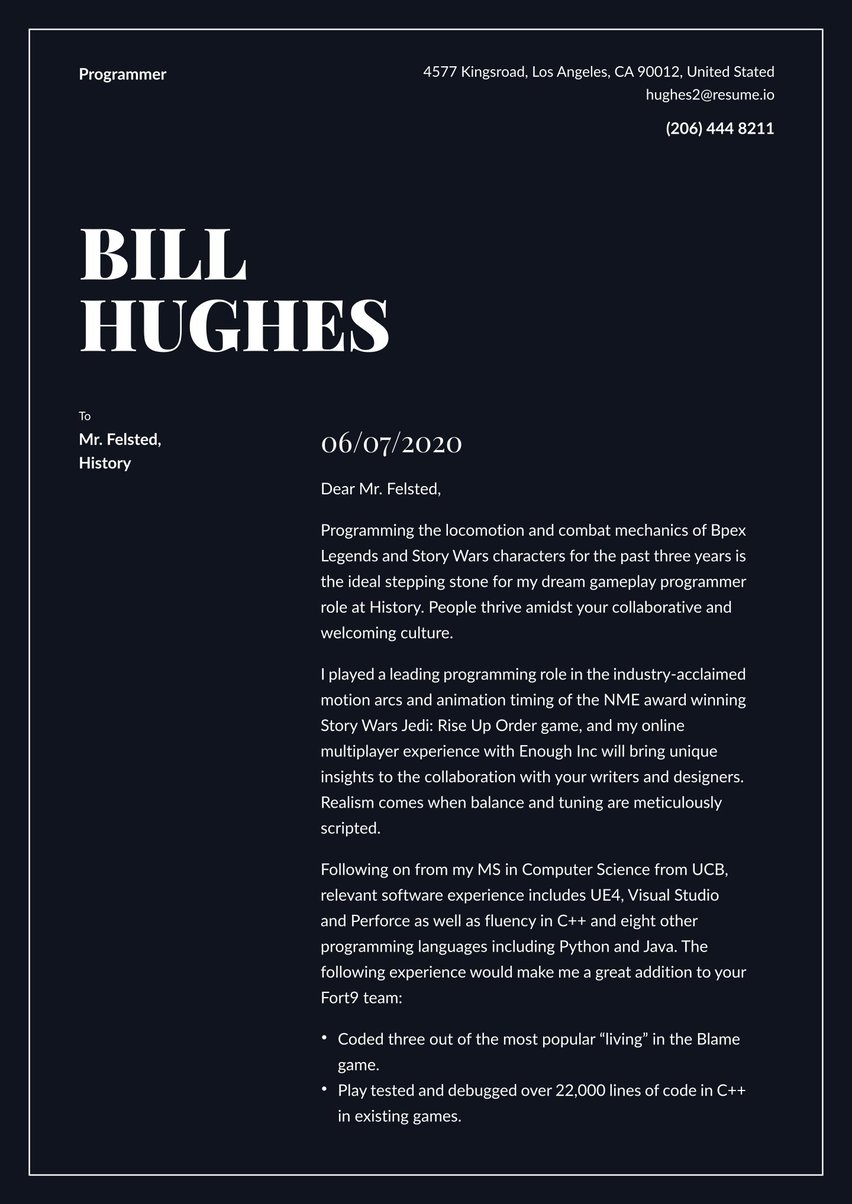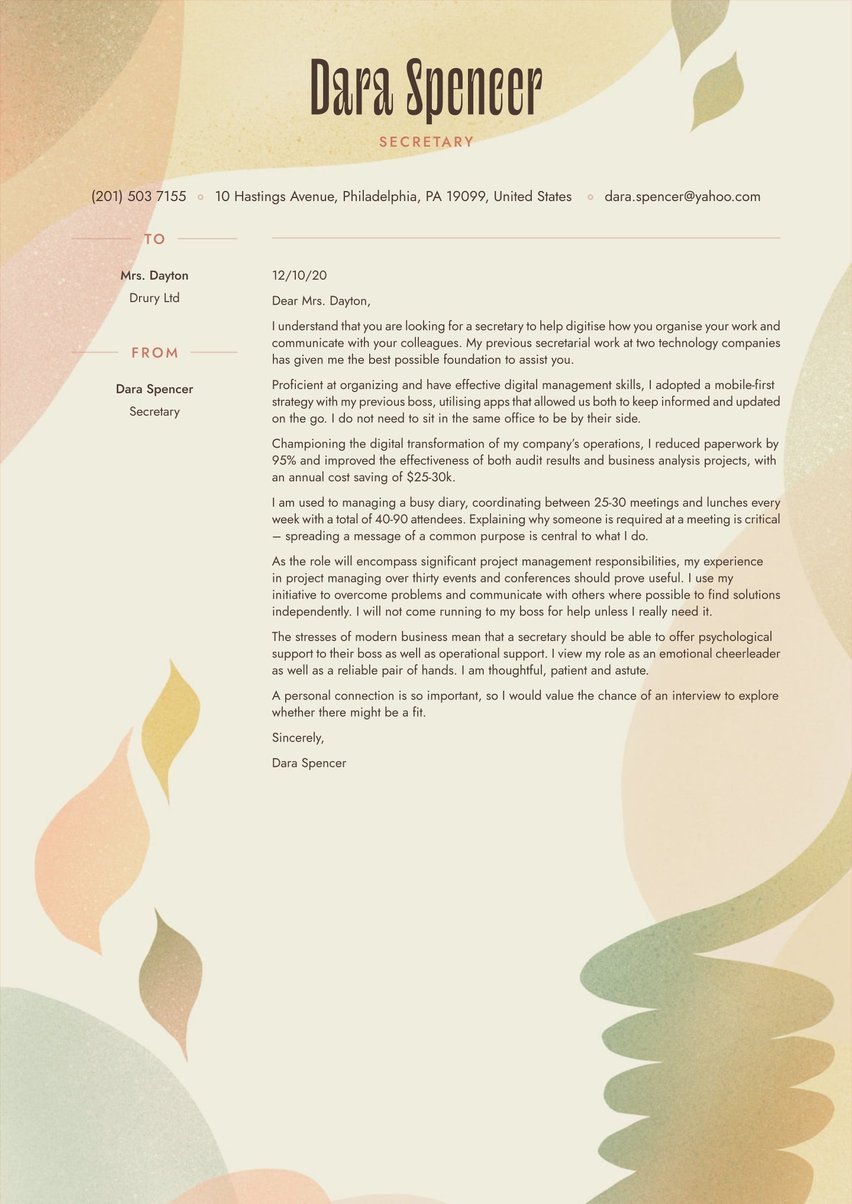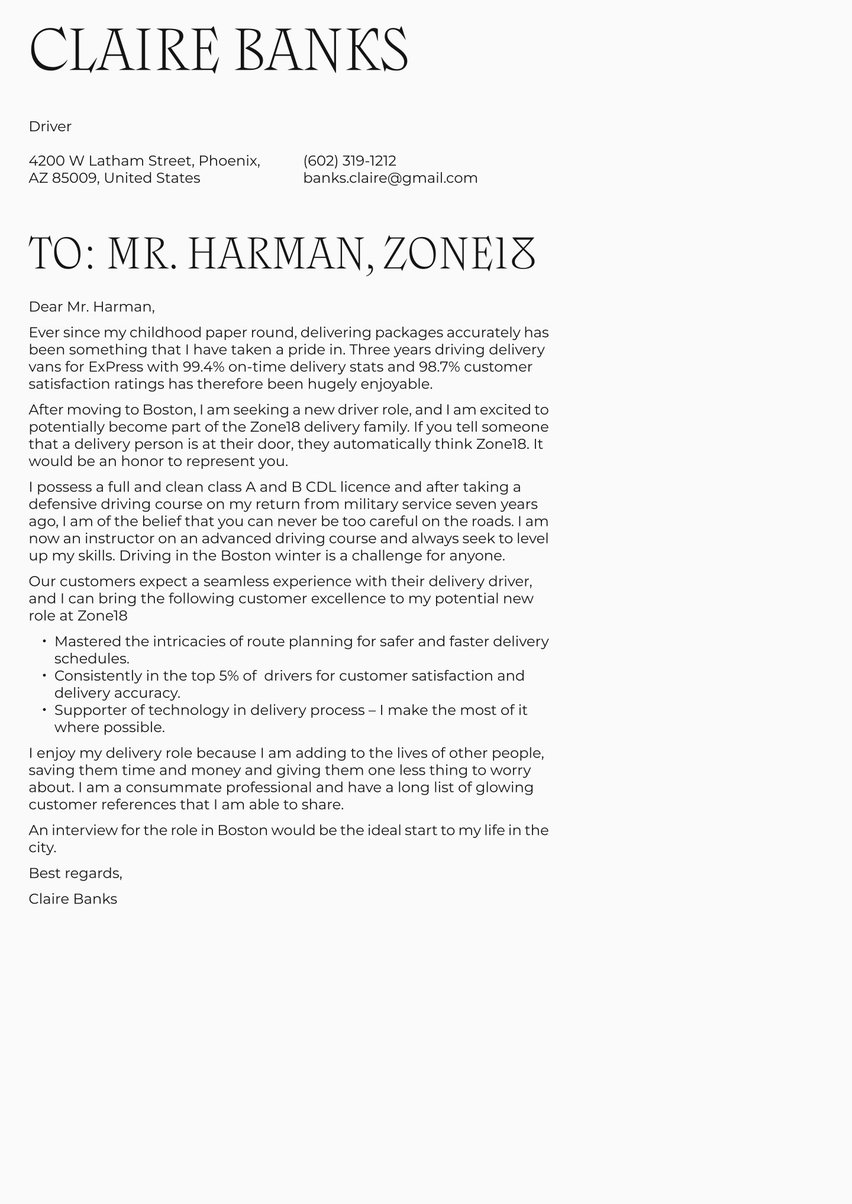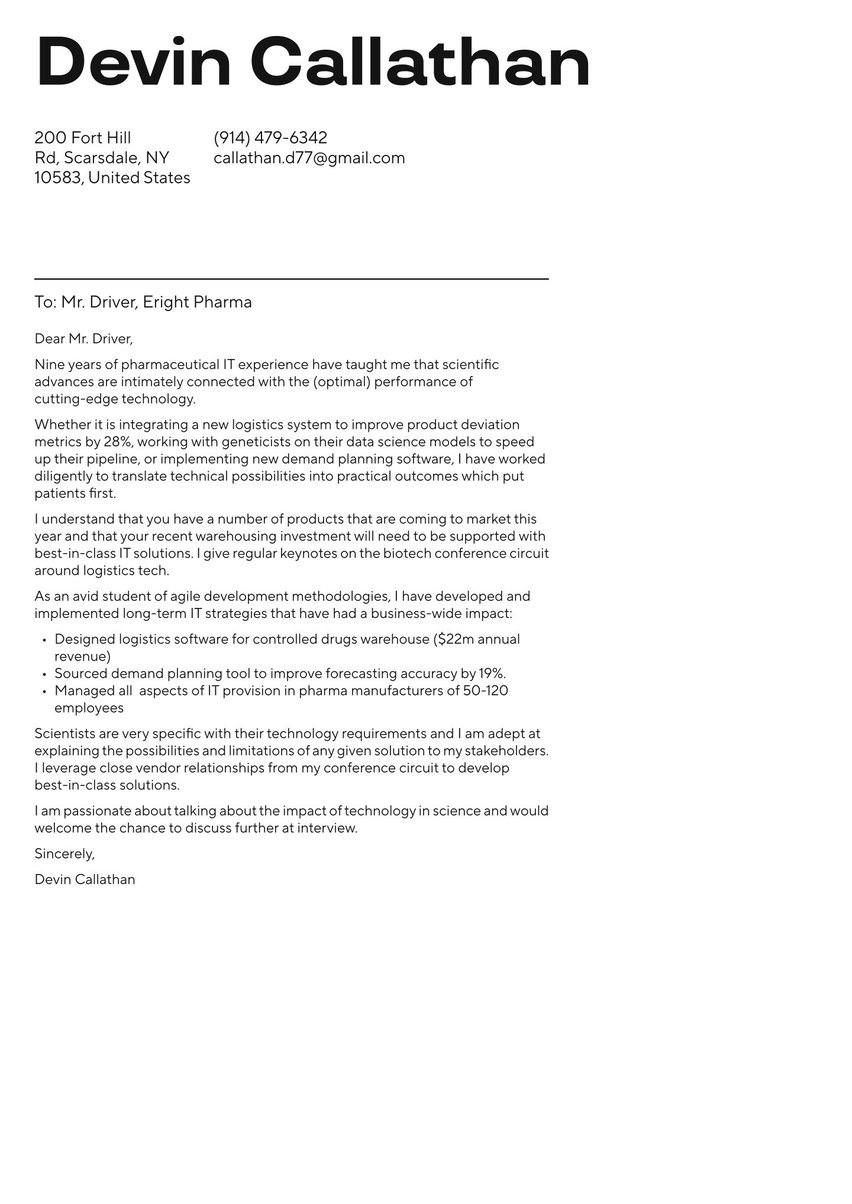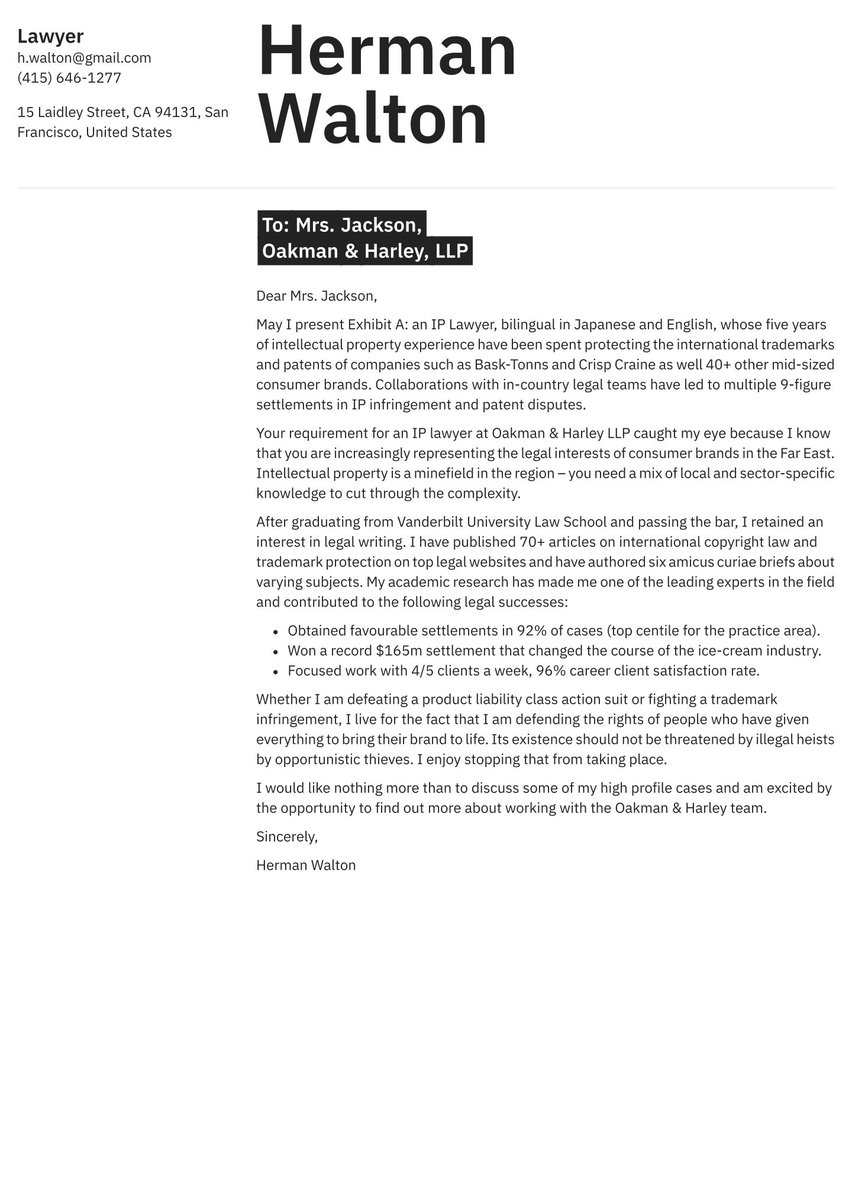The best sales pitches are brief, powerful, and memorable. Their appeal to reason is hard to deny, evoking an emotional response that demands action. If a targeted sales message hits home, customers are ready to buy. An effective sales cover letter works the same way.
Sales cover letter examples by experience level
To win the job, your cover letter must appeal to the hiring manager’s needs while showcasing your unique value proposition. You’re already a sales expert, so it’s time to sell your skills.
Sales full text-only cover letter example
Dear Mr. Hunter,
Delighting a freight customer is about far more than availability and pricing. When competing with my sales manager rivals to sell empty space on a container ship, the basic variables of service and cost are not enough to give me an edge. I need to convince customers that working with them is worth paying for. I sell my colleagues rather than my containers.
As Crano Worldwide is expanding its routes in the Far East, I hope that my B2B sales experience in the region may prove useful. I have networked here for the past decade, speaking at transport conferences, building relationships with 250+ importers and exporters, and doubling market share from 4% to 8% over a six-year period. As a student of the intricacies of the Chinese tender process, I understand how to influence effectively.
Crano encourages a winning mentality at work, and I would fit in well. To demonstrate that I understand the subtleties of selling freight forwarding, consider my track record:
- Increased the ocean freight customer base by an average of 25% over the past five years.
- Averaging 92% annual client retention.
- Increasing annual profit growth per customer by 16%.
- Exceeded annual sales quota by an average of 45% over the last six years.
- 150+ Far Eastern clients — more than half of which could potentially move to Crano.
- Generated $2.3m revenue last fiscal quarter.
- Consistently top in global sales list.
Seeking to understand the precise requirements of each customer is the key to finding those critical negotiation levers and squeezing the potential out of every opportunity. I enjoy the role most when I am managing a fluid sales process rather than simply reacting to leads.
I was referred to this career opportunity by one of your current sales managers, David Grey. I hope for the opportunity of an interview to see why he loves working for you so much.
Sincerely,
Christine Foster
Sections of a sales cover letter
While your sales pitch should be as unique as possible, all cover letters should follow the same structure regardless of occupation.
- Cover letter header. Establish who it is from and how the recruiter can reach you. Include your name and contact information.
- Greeting. Start off on the right foot by making a direct personal connection that sets the tone for further interaction during the hiring process. Greet the reader by name if at all possible.
- Introduction. Perfect your elevator pitch by making it clear what you can deliver.
- Body. Paint a picture of your sales persona in your own words and allow the reader to imagine what your sales skills would bring to their organization.
- Conclusion. Close your letter by reiterating your interest and why you’d be the best salesperson for the company. Leave them wanting to get in touch with a snappy call to action.
- Signature. Sign off with a professional goodbye, including your name.
Each section of your cover letter is an important piece of the overall narrative about your passion for sales and your professional successes.
Shoot for a one-page cover letter that lists your skills concisely and weaves them into a compelling sales pitch that aligns with the company’s needs. It’s all about building a relationship and creating a connection.
Need more inspiration? View our other related cover letter examples from the library and education sector:
For general information and details that cover every section, check out our article on how to write a cover letter.
After crafting your header and addressing the hiring manager, you’re ready to capture their attention with your introduction.
Use a sales technique (or two) in your cover letter
There are many techniques salespeople use to close deals. If you liberally use a couple of these in your cover letter, it can hint at your wealth of sales savvy.
One idea is to identify a sales “pain point” of your future employer. Point out the benefits of hiring you and end with a pithy closing remark. You can do that within a sentence by mirroring the sort of influencing techniques that you might use with a sales client. If successful, you not only persuade the hiring manager that you are the person for the job, but also provide insight into your sales craft.
Introduction of a sales cover letter
The first sentence or two that start your cover letter give you a chance to show off.
Offer a vision of exactly what you'll bring to your future employer. Talk about smashing sales targets, fueling growth, and winning new clients. Give your cover letter a positive start and the reader will be hanging on your every word with whatever else comes next.
Dear Mr. Hunter,
Delighting a freight customer is about far more than availability and pricing. When competing with my sales manager rivals to sell empty space on a container ship, the basic variables of service and cost are not enough to give me an edge. I need to convince customers that working with them is worth paying for. I sell my colleagues rather than my containers.
Hello, my name is Alex, and I am interested in the sales position at your company. My experience includes over three years in sales, which I feel makes me a good candidate for the role.
Sharing concrete figures in the introduction shows that you understand the importance of results. Think carefully about those numbers to ensure they are genuinely impressive. For instance, if you exceeded your quota by 50% or doubled the revenue, mention that right up front.
This does more than just document your qualifications; it gives specific examples of what you’ve achieved and how you’ve made an impact.
Dear Mr. Hunter,
Delighting a freight customer is about far more than availability and pricing. When competing with my sales manager rivals to sell empty space on a container ship, the basic variables of service and cost are not enough to give me an edge. I need to convince customers that working with them is worth paying for. I sell my colleagues rather than my containers.
Sales cover letter body
In the body of your cover letter, follow a clear template:
- Highlight your sales skills and experience
- Show how you're a perfect fit for the company’s culture
- Close out with a conclusion that packs a punch
- Sign off with a call to action that leaves the hiring manager compelled to contact you
First body paragraph: your suitability for the role (skills & experience)
Set the stage by sharing a couple of your most relevant projects, then fill in the gaps by detailing how your sales smarts made a difference and why your approach worked well. It seems so much more real when you give the context for your success.
Here’s how you can weave your qualifications into an engaging narrative:
- Emphasize relationship building & customer experience skills. Share stories that bring to life your ability to understand customers’ unique needs and provide exactly the solution they’re looking for.
- Show off your sales achievements. If you’ve got a track record of exceeding quotas or skyrocketing revenue, definitely present that to the hiring team up front.
- Communication skills: A successful sale is all about communication, so be sure to show off your exceptional interpersonal skills and how you’ve used them to close deals and delight customers.
- Technology chops. The most successful salespeople use a wide range of digital apps and social media techniques, so it's important to portray yourself as being at the cutting edge of the industry in this regard.
- Highlight your education. Do you have a degree in business or marketing, or any relevant sales certificates? It’s worth calling that out to bolster your credentials.
- Organizational skills. Salespeople are busy and have to keep track of several customers, deals, and products. Detail your ability to keep everything running smoothly.
Second body paragraph(s): alignment with the organization
You know that when you sell to a customer, you have to get on their level and understand their unique pain points before you can close the deal. Similarly, you should craft a cover letter that proves why the organization needs to hire you to solve their challenges.
Do some research into the company, then share what resonates with you about their mission, vision, and goals.
In this example of Crane Worldwide, there are some key points on their website, including:
- Providing top service with “expertise that always exceeds expectations”
- Hiring “highly trained people with unparalleled dedication”
- Being “flexible, responsive, and dynamic”
Once you have a feel for the company’s ethos, you can incorporate specifics from your own experience into your letter to show how you align.
In this case, you might discuss how you’ve maintained high service, how you exhibit dedication, or how you’ve consistently remained responsive to your customers.
As Crano Worldwide is expanding its routes in the Far East, I hope that my B2B sales experience in the region may prove useful. I have networked here for the past decade, speaking at transport conferences, building relationships with 250+ importers and exporters, and doubling market share from 4% to 8% over a six-year period. As a student of the intricacies of the Chinese tender process, I understand how to influence effectively.
Crano encourages a winning mentality at work, and I would fit in well. To demonstrate that I understand the subtleties of selling freight forwarding, consider my track record:
- Increased the ocean freight customer base by an average of 25% over the past five years.
- Averaging 92% annual client retention.
- Increasing annual profit growth per customer by 16%.
- Exceeded annual sales quota by an average of 45% over the last six years.
- 150+ Far Eastern clients — more than half of which could potentially move to Crano.
- Generated $2.3m revenue last fiscal quarter.
- Consistently top in global sales list.
Seeking to understand the precise requirements of each customer is the key to finding those critical negotiation levers and squeezing the potential out of every opportunity. I enjoy the role most when I am managing a fluid sales process rather than simply reacting to leads.
Call to action & conclusion: Finish off strong
Sum up your cover letter by being humble and presenting yourself as the best fit for the role. Let the reader know you would love to further explore the possibility.
Add a compelling call to action that encourages the reader to speak in more detail.
Don’t forget to thank the reader for their time and consideration; this is kind and mannerly and gives you a chance to reaffirm your interest in the role.
I was referred to this career opportunity by one of your current sales managers, David Grey. I hope for the opportunity of an interview to see why he loves working for you so much.
Sincerely,
Christine Foster
Conclude by signing off with your name to leave a final impression.
How to write a sales cover letter with no experience
Writing a sales cover letter without direct sales experience is a great exercise to practice your sales skills. Without relying on prior sales work, you can be creative and sell your transferable skills.
Consider these points:
- Highlight transferable skills. Several skills transfer to success in sales, so be sure to call them out. For instance, do you have customer service experience in a call center or retail establishment? Have you honed your communication and interpersonal skills as a bartender or server?
- Showcase negotiation abilities. Maybe you haven’t officially worked in sales, but perhaps you’ve negotiated contracts or other deals. That’s a great skill to leverage as a salesperson.
- Emphasize technological proficiency. The sales world is becoming ever more technical, so use this space to showcase your tech skills, whether it's working with CRM systems or AI tool knowledge.
- Mention any relevant volunteer experience. Have you volunteered to lead fundraising for a nonprofit? Have you helped with procurement for an event? That’s very similar to the work you might do as a salesperson.
- Include academic background. Mention your education in relevant fields like business or marketing. If you’ve achieved any sales certifications, share those as well.
All of these points will help balance out the lack of direct experience in your cover letter and illustrate your high potential as a winning salesperson.
Consider ATS
The Applicant Tracking System (ATS) is an electronic system that companies use to collect and manage applications. Some advanced systems offer the option of using an algorithm to help filter high volumes of applications by scanning for specific keywords.
Review the sales job listing and pinpoint words that are frequently used or seem significant. Then, if they are relevant to you, ensure you incorporate them naturally in your cover letter.
Example:
- “Exceed quotas”
- “Cold calling”
- “CRM”
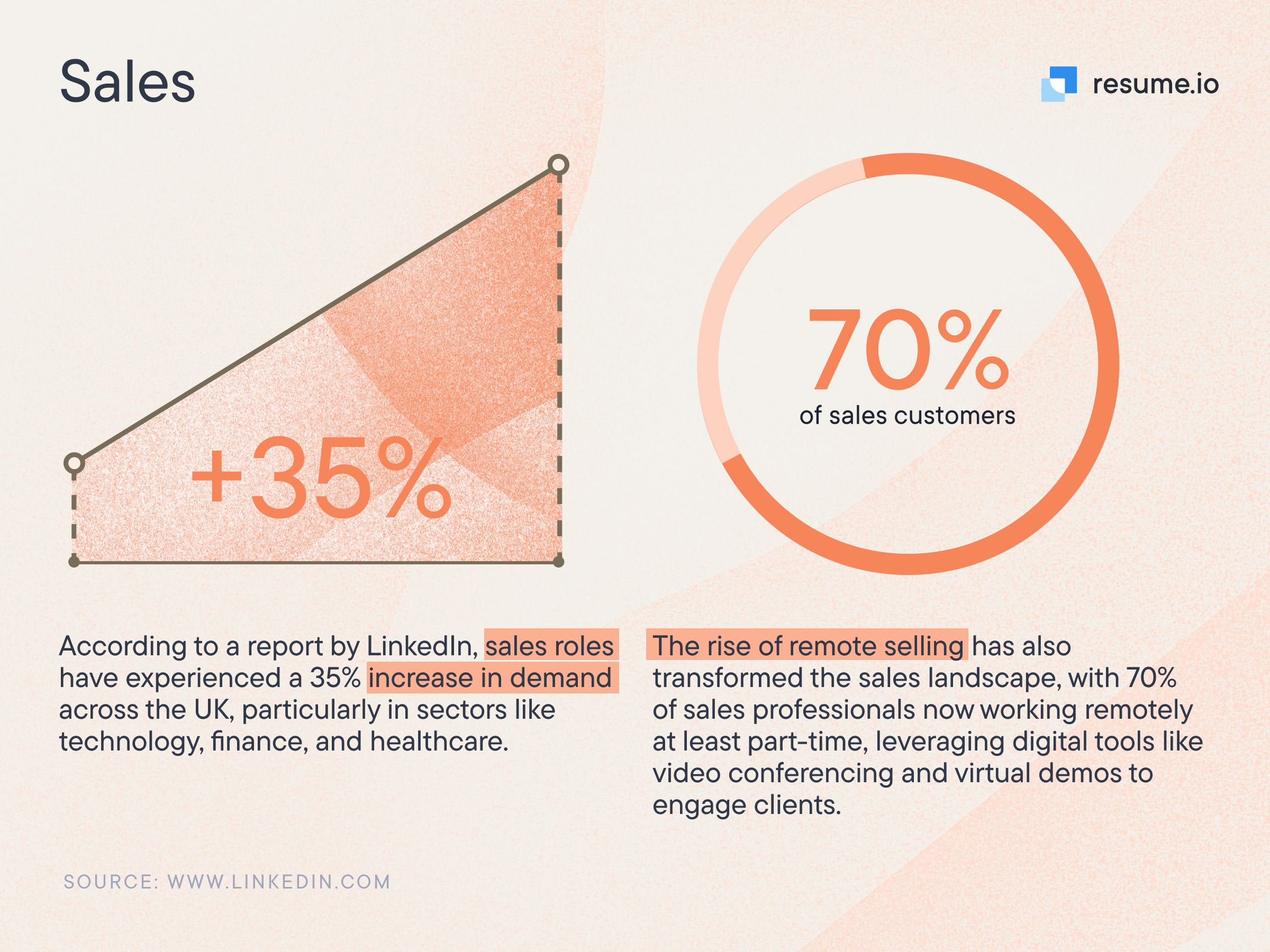
Key takeaways
A well-crafted sales cover letter will help you showcase your unique value proposition and land the job. Pull out all the stops and use all of your sales influencing skills and persuasive tactics in your cover letter.
Drive home your key benefits for the prospective employer and show that you understand what it takes to sell that company's products or services. Highlight your relevant skills, experiences, and passion for the field.
Kickstart your sales job search with our cover letter generator and accompanying resume builder. Then supercharge your efforts with Resume.io.
Unlock 18 powerful tools to search for jobs, track your progress, ace your interviews, and negotiate the best salary—all within our comprehensive career toolkit.





